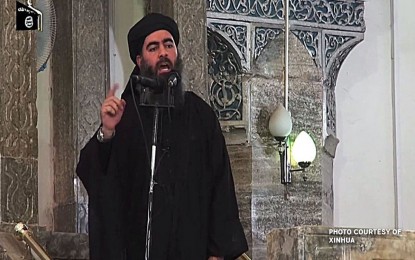News
Int’l community remains cautious after IS leader’s death

The DNA test from the aftermath positively identified al-Baghdadi, said Trump. (File photo from Xinhua via PNA)
WASHINGTON — US President Donald Trump said on Sunday that Islamic State (IS) leader Abu Bakr al-Baghdadi had been killed in a US military operation in Syria.
Speaking in the White House, Trump said US Special Operations Forces conducted a raid Saturday night targeting al-Baghdadi in northwest Syria, during which al-Baghdadi killed himself by igniting a suicide vest.
The DNA test from the aftermath positively identified al-Baghdadi, said Trump.
“I want to thank the nations of Russia, Turkey, Syria and Iraq. I also want to thank the Syrian Kurds for certain support they were able to give us. This was a very, very dangerous mission,” Trump added.
Following Trump’s announcement, however, the Russian Ministry of Defense said that it doesn’t have reliable information regarding al-Baghdadi’s death.
The increase in the number of direct participants and countries that allegedly took part in this “operation,” each with completely contradictory details, gives rise to reasonable questions and doubts in its reality and success, the ministry said in a statement.
In response to Trump’s announcement, Iran’s Telecommunications Minister Mohammad Javad Azari Jahromi tweeted: “Not a big deal! You just killed your creature.”
On Sunday, some US traditional allies welcomed the announcement of al-Baghdadi’s death while cautioning that the fight against terrorism is far from over.
“Baghdadi: early retirement for a terrorist, but not for his organization,” French Defense Minister Florence Parly tweeted.
British Prime Minister Boris Johnson hailed the death of Islamic State leader al-Baghdadi as “an important moment” but also warned that the fight against the IS “is not yet over.”
According to a report of the Washington Post, Javed Ali, a former White House senior director for counterterrorism, said al-Baghdadi’s death would be a “huge blow,” but the IS has proved resilient.
“His death will certainly have an impact on the terrorist group, but mostly it would be a symbolic and short-lived tactical victory in the fight against the Islamic State (IS) group,” said Najib Khalaf, a political analyst and politics lecturer at Iraq’s al-Nahrain University.
“The elimination of the self-claimed caliph will not completely reduce the Islamic State’s threat, as both the Salafi jihadist ideology and the splintered remains of its organization will remain strong,” Iraqi political analyst Nadhum al-Jubouri told Xinhua.
Al-Jubouri told Xinhua that al-Baghdadi’s death “will reduce the morale of his elements, as many are expected to leave the group, but some who strongly follow the extremist ideology of the group believe that killing a person doesn’t mean to end their ideology.”
The analyst predicted that the battle against the organization would continue, warning “the militant group will focus on qualitative operations … to prove that the group is not finished by the death of its leader.”
Al-Baghdadi, 48, whose real name was Ibrahim Awad al-Badri, announced the establishment of a caliphate, or the so-called IS, in June 2014.
In 2016, the US State of Department offered a reward of up to USD25 million for information leading to al-Baghdadi’s capture or death. (Xinhua)





















